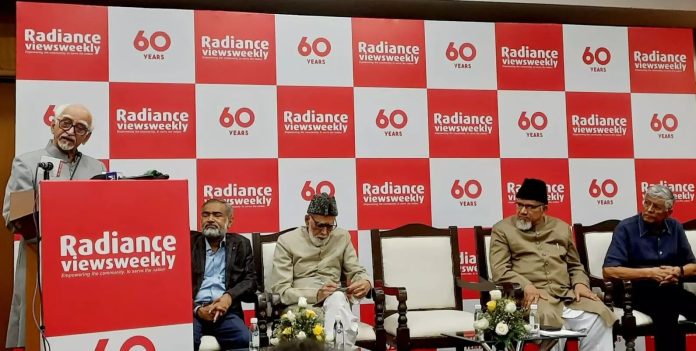“Hate is a toxic tonic…. it necessitates a collective effort involving legislative reforms, sensitisation campaigns, community policing and youth engagement.” – Former Vice President Hamid Ansari
– Radiance News
New Delhi, October 23: It was a historic day for Radiance Viewsweekly as friends, well-wishers, academicians, intellectuals and mentors gathered to celebrate the 60 years journey of the weekly at India International Center here last evening.
It was a proud and momentous moment for all those assembled to mark the occasion with the faces revealing their zeal and satisfaction to do more in the years to come in order to represent the voice of the community in a more meaningful and effective manner despite the challenges ahead.
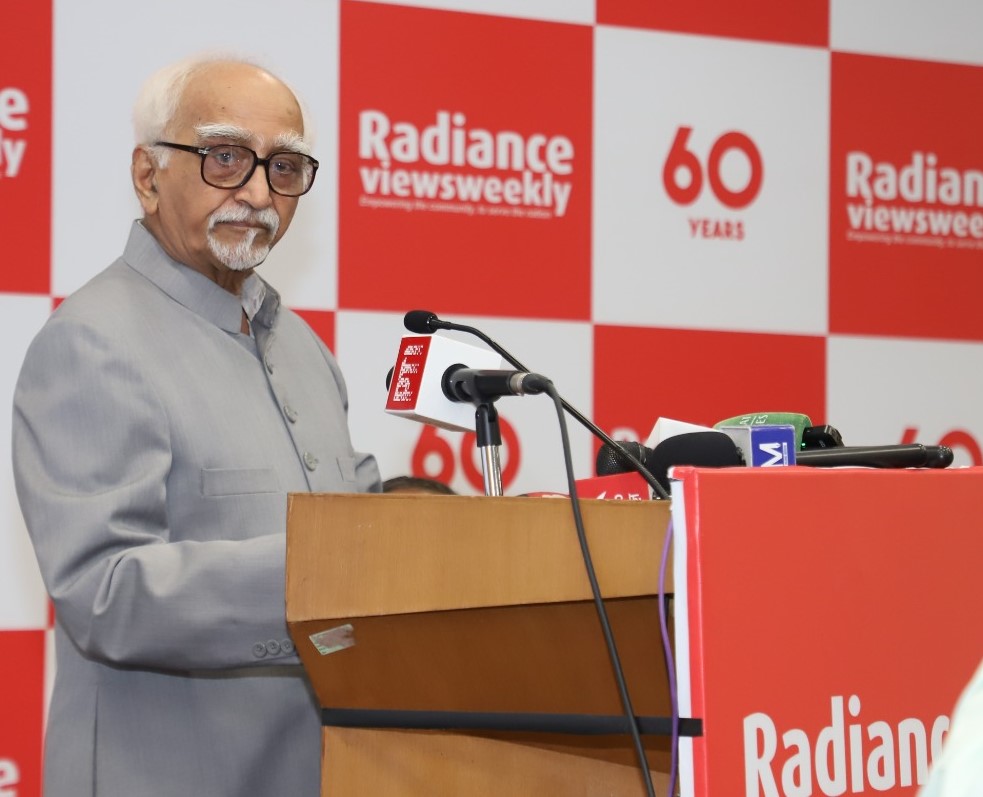
Addressing as Chief Guest, Hamid Ansari, former Vice President of India, in his keynote address, referred to the Constituent Assembly and a sub-committee on minorities to remind the audience, “In its final report in 1949 it voted against separate communal reservation. This, said Congress leader Ajit Prasad Jain on November 22, ‘smoothened’ our work of constitution-making, in particular the question of minorities which has been our headache and which thwarted all our efforts for the solution of national problems, has ceased to be live issue.”
He added, “Three days later on November 25, Sardar Patel said that in the interest of laying down ‘real and genuine foundations of a secular state in the country’ nothing was better for the minorities than to trust the good sense and sense of fairness of the majority, and to place confidence in them. Like-wise the majority must think of what minorities felt. He expressed the fervent hope that in the long run, ‘it would be in the interest of all to forget that there is anything like majority or minority in this country, and that in India there is only one community’. Three quarters of a century later, history makes its own judgement on intentions and reality.”
On democracy, the former Vice President said, “Democracy admittedly is rule by majority but its essential prerequisite is Rule of Law, defined by Dicey as (a) absolute supremacy of regular law (b) equality before the law and (c) access to justice and development of law by the judges on a case-by-case basis. This, as Prof. Upendra Baxi has argued, goes beyond a mere division of functions in modes of governance and incorporates four core notions of rights, development, governance and justice. This approach has been upheld in judicial pronouncements.”
On the threat to the rule of law, he said, “In a paper published in 2005, the late Goolam Vahanvati observed that ‘the Rule of Law in this country is under serious threat’ adding that ‘it would not be an overstatement if one concludes that each institution is destroying itself from within’ and that ‘there are cancerous developments eating into the fabric of each institution. If these trends are not arrested, they are bound to be destructive of the Indian state in the long run.”
Delivering a talk on Media and Minorities, during 60 years celebrations program of the weekly, the former Vice President said, “The rationale for journalism in a democracy is to inform, educate, guide, and entertain. Each of these is a desired function, more so in modern societies whose size and numbers need means of communication other than direct face-to-face ones. This is sustained by law. Open criticism of Government policies and operations is not a ground for restricting expression. We must practice tolerance to the views of others. Intolerance is as much dangerous to democracy as to the person himself.”
He further said, “Studies have shown that democracies have been at times threatened by elected leaders who subvert the very process that brought them to power. ‘The electoral road to breakdown is dangerously deceptive,’ wrote Levitsky and Ziblatt in their 2018 book How Democracies Die. It opens the door to would-be-authoritarians. They categorise key indicators of authoritarian behaviour as (i) weak commitment to democratic rules of the game, (ii) denial of the legitimacy of political opponents, (iii) toleration or encouragement of violence, and (iv) readiness to curtail civic of opponents, including media.”
On the challenges, he said, “The challenge before us today is to develop strategies and methodologies to address them. Instances of breach of security at individual or group level continue to occur with disturbing frequency. Most reveal a failure of the state apparatus to respond in a timely manner, compounded by failure of media houses that often ‘dictate a majoritarian mindset’. A good instance of it is the report entitled Delhi’s Agony on the communal violence in Delhi in February 2020 and its section subtitled the Aftermath. Civil society reports on violence elsewhere, and court observations relating to them like the Punjab & Haryana High Court ruling recently in August, suggest a disturbing pattern of studied neglect by local or state administrations.”
On the hate-filled atmosphere and the way forward, he said, “Hate is a toxic tonic. It is, regrettably, becoming part of normal discourse and is not being discouraged. Hate crimes convey a message to targeted communities that they are unwelcome and unsafe, impacting the collective sense of security and well-being. It has been suggested that it necessitates a collective effort involving legislative reforms, sensitisation campaigns, community policing and youth engagement.”
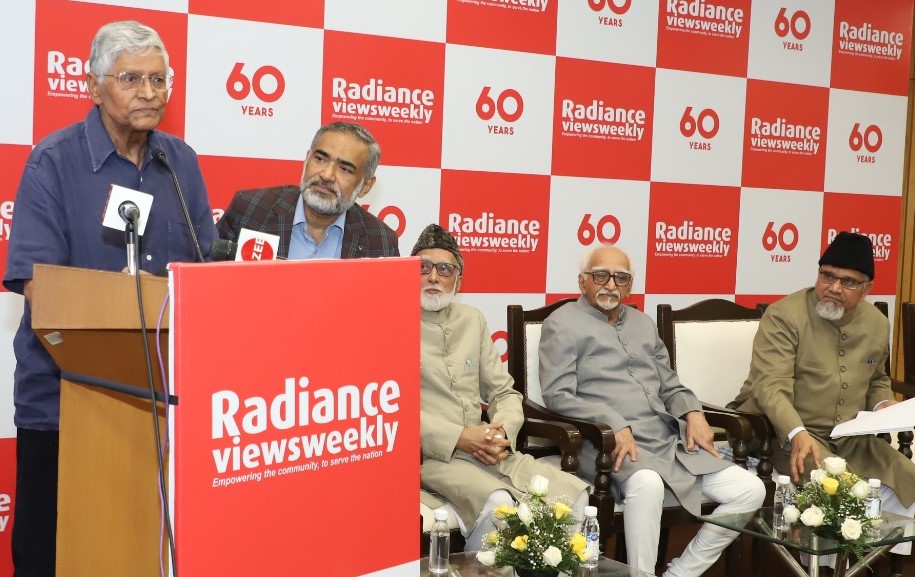
Former BBC journalist Satish Jacob, while speaking on Media and Indian Muslims, talked in detail about the role of media and said not only Muslims but Media too is facing danger and threats. He said, “Being part of the media I have no hesitation in saying that media has let us down.” He honestly apologised for the role of media and the kind of atmosphere it is trying to create.
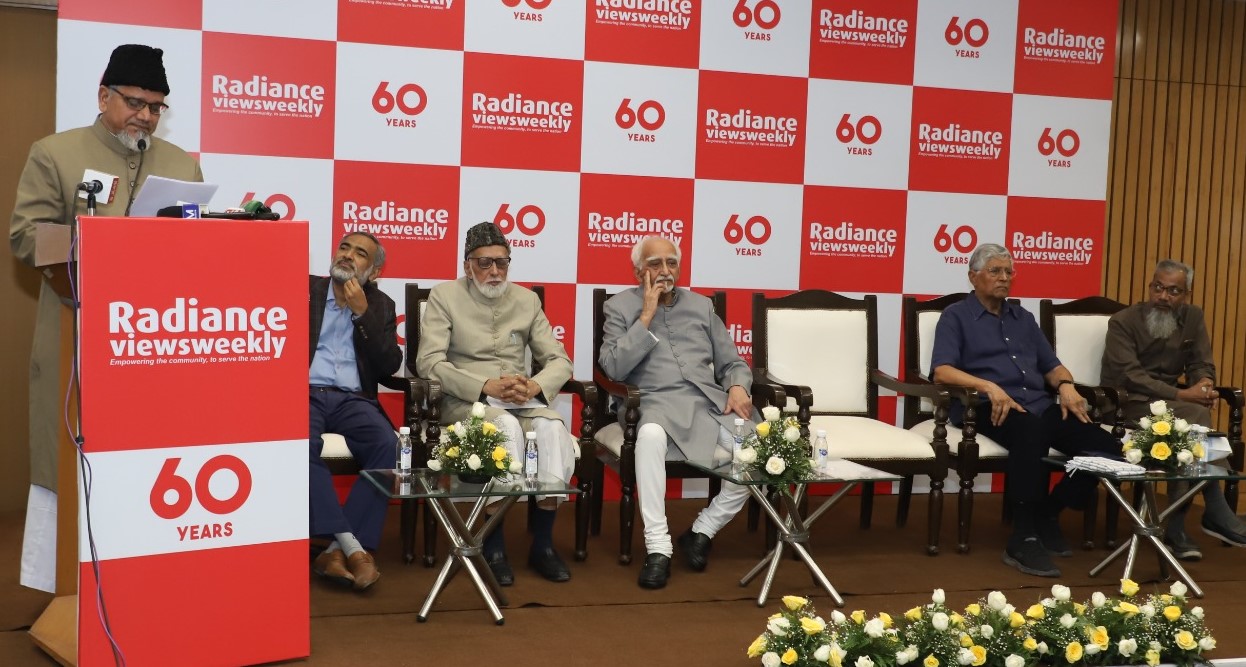
Presiding over the programme, Professor Mohammad Salim Engineer, Chairman of the Board of Islamic Publications, said, “In the last 60 years Radiance has tried to become the voice of the voiceless, downtrodden, deprived and oppressed people and serving the Indian society. Radiance has been raising voice for justice, truth, and Muslims and other minorities and tribals and other weaker sections.”
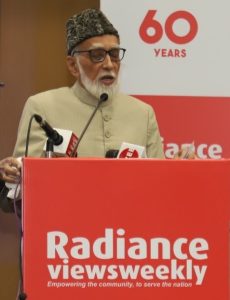
Earlier, Ejaz Ahmed Aslam, Editor-in-Chief of the weekly, in his inaugural address, highlighted the journey of Radiance so far.
Intellectuals like Prof. Arun Kumar, H. Abdur Raquib, Salimullah Khan and Dr. Khan Yasir, senior journalists like Ziya us Salam, Syed Nooruzzaman, A.U. Asif, Syed Khalique Ahmed, Abdul Bari Masoud and Abhay Kumar, former Director Radiance Intizar Naeem and former Manager Radiance Kamal Ahmad as well as a host of Radiance friends, including ladies participated in the program.
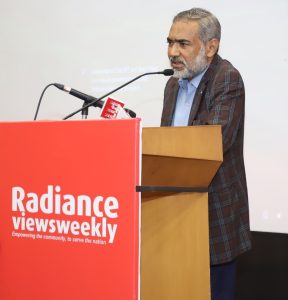
Syed Tanveer Ahmed, Secretary of the Board of Islamic Publications, compered the program.
Sikandar Azam, Editor of the weekly, extended vote of thanks.


